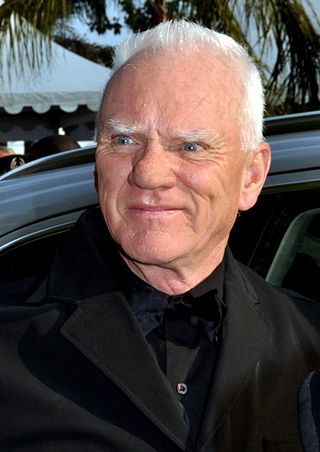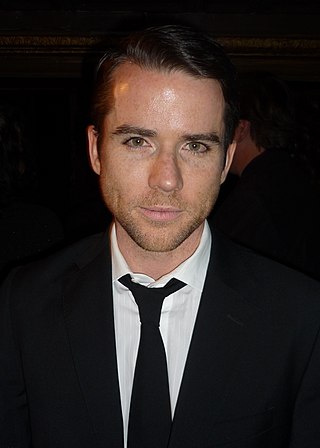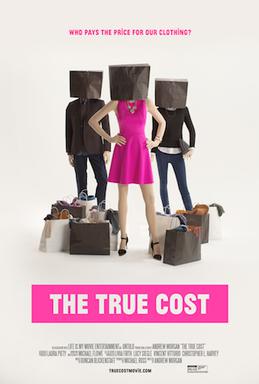Related Research Articles

Malcolm McDowell is an English actor. He first became known for portraying Mick Travis in Lindsay Anderson's if.... (1968), a role he later reprised in O Lucky Man! (1973) and Britannia Hospital (1982). His performance in if.... prompted Stanley Kubrick to cast him as Alex in A Clockwork Orange (1971), the role for which McDowell became best known.

Robert John Downey Sr. was an American film director, screenwriter and actor. He was known for writing and directing his underground film Putney Swope (1969), a satire on the New York Madison Avenue advertising world. According to film scholar Wheeler Winston Dixon, Downey's films during the 1960s were "strictly take-no-prisoners affairs, with minimal budgets and outrageous satire, effectively pushing forward the countercultural agenda of the day." He was the father of American actor Robert Downey Jr.

Christian Campbell is a Canadian actor. He is known for his roles as Gabriel in the film Trick, Greg Ivey in the television series Big Love and on stage as Jimmy Harper in the musical Reefer Madness.

Morgan Valentine Spurlock was an American documentary filmmaker, writer, and television producer. He directed 23 films and was the producer of nearly 70 films throughout his career. Spurlock received acclaim for directing the documentary Super Size Me (2004), which was nominated for the Academy Award for Best Documentary Feature Film. He produced What Would Jesus Buy? (2007) and directed Where in the World Is Osama bin Laden? (2008), POM Wonderful Presents: The Greatest Movie Ever Sold (2011), Comic-Con Episode IV: A Fan's Hope (2011), and One Direction: This Is Us (2013).
The Camp Kill Yourself crew was a group of friends and relatives centered around television personality and skateboarder Bam Margera, many of whom are from or located in and around West Chester, Pennsylvania. The crew was active from Landspeed presents: CKY (1999) to Minghags: The Movie (2009). Some members of the crew were skateboarders, while others were involved either on-camera or behind-the-scenes in Margera's various projects such as the CKY videos, Jackass, Viva La Bam, Haggard: The Movie, Bam's Unholy Union, Minghags: The Movie, and Radio Bam.

Pablo Ferro was a Cuban-American graphic designer, film titles designer, and founder of Pablo Ferro Films.

The Mummers Parade is held each New Year's Day in Philadelphia. Started in 1901, it is the longest-running continuous folk parade in the United States.

Albert Stotland Ruddy was a Canadian-American film and television producer. He produced The Godfather (1972) and Million Dollar Baby (2004), both of which won him the Academy Award for Best Picture, and co-created the CBS sitcom Hogan's Heroes (1965–1971).

A Clockwork Orange is a 1971 dystopian crime film adapted, produced, and directed by Stanley Kubrick, based on Anthony Burgess's 1962 novel. It employs disturbing and violent themes to comment on psychiatry, juvenile delinquency, youth gangs, and other social, political, and economic subjects in a dystopian near-future Britain.
Kurt Raab was a West German stage and film actor, as well as a screenwriter and playwright. Raab is best remembered for his work with German film director Rainer Werner Fassbinder, with whom he collaborated on 31 film projects.
Jerry Butler was an American pornographic film actor. His career lasted from 1981 to 1993, and included more than 500 films.

Aubrey Morris was a British actor known for his appearances in the films A Clockwork Orange and The Wicker Man.

Stephen Woolley is an English filmmaker and actor. His career has spanned over three and a half decades, for which he was awarded the BAFTA award for Outstanding British Contribution to Cinema in February 2019. As a producer, he has been Oscar-nominated for The Crying Game (1992), and has produced multi-Academy Award nominated films including Mona Lisa (1986), Little Voice (1998), Michael Collins (1996), The End of the Affair (1999), Interview with the Vampire (1994), and Carol (2016). He runs the production company Number 9 Films with his partner Elizabeth Karlsen.

Lorenda Starfelt was an independent film producer, as well as a committed political activist and blogger who notably dug up president Barack Obama's birth announcement in an August 1961 edition of The Honolulu Advertiser while researching her documentary on the 2008 presidential election, The Audacity of Democracy.

A poet shirt is a type of shirt made as a loose-fitting blouse with full bishop sleeves, usually decorated with large frills on the front and on the cuffs. Typically, it has a laced-up V-neck opening, designed to pull over the head, but can have a full-length opening fastened by buttons. The collar may be standing or folded over with points. Fabrics commonly used in its manufacture include linen, cotton, satin and velvet, while frills may be of the same fabric or of lace. Originally intended as a male garment, it is also worn by women today.
Abhijit Kokate is an Indian film editor in Bollywood, most known for his films, Not a Love Story (2011), Department (2012) and most recent film, Queen (2014).

The True Cost is a 2015 documentary film directed by Andrew Morgan that focuses on fast fashion. It discusses several aspects of the garment industry from production—mainly exploring the life of low-wage workers in developing countries—to its after-effects such as river and soil pollution, pesticide contamination, disease and death. Using an approach that looks at environmental, social and psychological aspects, it also examines consumerism and mass media, ultimately linking them to global capitalism. The documentary is a collage of several interviews with environmentalists, garment workers, factory owners, and people organizing fair trade companies or promoting sustainable clothing production.
Ricki Stern is an American film director, screenwriter, producer, most known for her documentarian work, and author. She works alongside Anne Sundberg. She is most known for The Trials of Darryl Hunt (2006), The Devil Came on Horseback (2007), The End of America (2007), Joan Rivers: A Piece of Work (2010), Surviving Jeffrey Epstein (2020), and Surviving Death (2021).
Si Litvinoff was an American film producer and lawyer. He served as a producer on Walkabout, All the Right Noises, and the documentary The Queen. He also served as an executive producer on A Clockwork Orange and The Man Who Fell to Earth. In 1954, he received his law degree from New York University. When he was a lawyer, his clients included Rip Torn, Andy Warhol, Bea Arthur, and Alan Arkin. Litvinoff was a member of the Academy of Motion Picture Arts and Sciences and its foreign language screening committee.